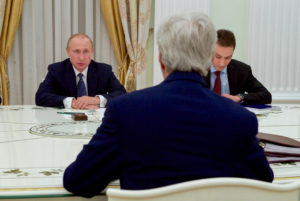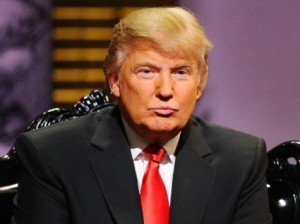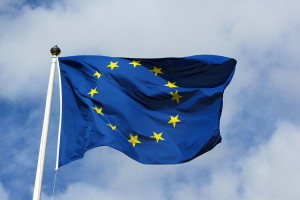Exclusive: European governments are nervous about a Trump presidency, but – for economic and other reasons – many on the Continent would welcome a friendlier approach toward Russia, reports Andrew Spannaus.
By Andrew Spannaus
Few in Europe expected Donald Trump to win the U.S. Presidential elections last November. The picture painted by the media and political class was convincing: despite the pent-up anger being expressed through protest candidates, Hillary Clinton was headed towards a decisive victory, as the majority of Americans couldn’t stomach someone as outrageous and unconventional as the reality TV star turned politician.
That’s not what happened, of course, as Trump earned an Electoral College victory by winning enough votes in key Midwestern states that have suffered from a loss of manufacturing jobs in recent decades. His victory has shaken the Western world to its core, making it clear that business as usual is no longer possible in terms of both economic and foreign policy.
In Europe the signs of the anti-establishment sentiment that dominated the U.S. election campaign have been present for some time. The most obvious example was the Brexit vote in June 2016, in which the population of the United Kingdom voted to leave the European Union. But protest movements have actually been on the rise for several years now, driven by the same basic issues as in the United States: a sense of economic and social insecurity – accompanied by a rise in anti-immigrant sentiment – driven by an economic policy that has made life harder for the middle class while enriching those at the top.
The growing anger against the institutions of the European Union, considered the main culprit for the failed economic policies, has made the élites desperate for some sense of stability, to help them weather the storm. As a result, a potential Clinton victory was openly welcomed by most political leaders.
After Trump’s victory, there were numerous press reports of worries among European governments regarding the incoming Administration’s foreign policy. Trump is understandably seen as unpredictable, but the key point revolves around his attitude towards Russia, the same issue that is currently dominating the institutional fight in the United States right now.
Just after the election The New York Times ran a story entitled “For Europe, Trump’s Election is a Terrifying Disaster,” suggesting that under the new President, the United States may embrace authoritarianism and no longer defend democracy. It was a theme that other mainstream news outlets also pushed.
On Nov. 17, The Associated Press wrote: “NATO members and other European countries are worried that under Trump, the U.S. will stop trying to police Russia’s behavior the way it has under Obama. Most concerning to U.S. allies are Trump’s effusive comments about Russian President Vladimir Putin, one of the first world leaders he spoke to after winning the election.”
Seeing Benefits
While it is true that former Soviet bloc countries such as Poland and Latvia would prefer to maintain the current hardline position towards Russia, the reality is that the largest E.U. members – France, Italy and Germany – actually stand to benefit from the diplomatic approach promised by President-elect Trump.
This doesn’t mean they supported his candidacy, though. First of all, they were told that he couldn’t win; and second, a Trump victory would seem to encourage the anti-establishment movements already on the rise in Europe, which threaten both the E.U.’s status quo and the jobs of key leaders, including German Chancellor Angela Merkel.
Hillary Clinton was seen as representing continuity, and for the many politicians who seek to curry favor with the transatlantic elites, it was best to show their Clinton bona fides in view of the upcoming change in power. For example, Italian Prime Minister Matteo Renzi – now out of office due to a stinging anti-establishment vote in a referendum on proposed constitutional reforms – repeatedly broke diplomatic protocol and publicly criticized Trump during the election campaign.
However, over the course of 2016 it became clear that Clinton’s foreign policy was far more aggressive than Barack Obama’s, as the President had actually been seeking collaboration with Russia for several years on issues, such as constraining Iran’s nuclear program and negotiating an end to the Syrian conflict, despite heavy opposition from within his own administration.
Indeed Trump’s openness towards Vladimir Putin seems even more heretical now because most have chosen to forget that Obama himself had sought close cooperation with Putin on several key issues. For instance, Secretary of State John Kerry’s diplomacy last year on Syria almost succeeded in implementing intelligence sharing and joint airstrikes by the two powers, before being effectively thwarted by the Pentagon and other U.S. institutional opposition in September 2016.
Now Obama seems to have forgotten his former position, and decided to fully toe the anti-Russian line, apparently convinced that he must do his part in the campaign to weaken Trump and prevent him from being an effective president, even in areas where their positions are not far apart.
It is possible that Trump will accelerate the timid attempts of his predecessor to abandon the “regime change” policies that have led to numerous disasters in the Middle East, and heightened tensions with Russia. The President-elect seems determined to pursue this path more openly than Obama, who worked slowly towards this goal while seeking to placate his critics with more bellicose language in his public statements.
Doubts About the U.S. Hardline
Although European nations have been heavily involved in recent regime change adventures (the U.K. in Iraq and France in Libya, for example), there is a widespread preference in Western Europe for avoiding further conflict with Russia. The U.S. position on the events in Ukraine, for example, is often seen as one-sided, and the notion of NATO expansion to Russia’s borders seems like an unnecessary and dangerous provocation that can only makes things worse.

U.S. Secretary of State John Kerry listens to Russian President Vladimir Putin in a meeting room at the Kremlin in Moscow, Russia, at the outset of a bilateral meeting on July 14, 2016. [State Department Photo]
For this reason, France, Italy and Germany have all repeatedly stated their desire to reduce or remove the sanctions altogether. The hope is that an agreement can be reached to defuse tensions in Ukraine, based on support for the Kiev government but broad autonomy for the ethnic Russian areas in eastern Ukraine.
Despite this desire to head off further conflict, European governments are usually careful not to openly break with U.S. policy; they are key members of NATO and have no desire to distance themselves from the leader of the alliance. However, if Donald Trump follows through on his stated goal of working “together with Russia,” the countries of Western Europe in particular may welcome the opportunity to advance their own economic interests and avoid finding themselves in the middle of a new Cold War.
Andrew Spannaus is a freelance journalist and strategic analyst based in Milan, Italy. He is the founder of Transatlantico.info, that provides news, analysis and consulting to Italian institutions and businesses. His book on the U.S. elections Perchè vince Trump (Why Trump is Winning) was published in June 2016.



Fortunately, the EU is in the midst of collapse. …deservedly.
The comment about Kissinger definitely bears attention. Paul Craig Roberts recently wrote about it: “What is Kissinger up to?” Trump could walk into a trap. I hope his advisers get him to view China more rationally in trade while backing down the new Cold War against Russia that Obama, NATO and neocons are stoking.
Good article! For the reasons stated in the article and in the various comments, I have written a proposal, describing the need to build up a neu Eurasian Elite to counter or compensate the old corrupt transatlantic elites, as well as giving a blueprint, of how this could be achieved.
On interest, I am willing to publish it here, or deliver it to anyone interested. Althoug only a draught it is about six pages long – and – as yet in German language. I intend to translate it to English and want to also find people to help me translate it into othe languages.
I’m not sure, if I am allowed to post my email adress here? – But I’ll try alfredkathatweb.de
Trump’s accession provides a greater scope of independence for European states. They also need to eliminate or replace the EU which has degenerated into the transmission band for neoliberal and yankee dominance over European states. This system cannot maintain itself without total propaganda and political control and will fail once these elements are vanquished.
“Now Obama seems to have forgotten his former position, and decided to fully toe the anti-Russian line, apparently convinced that he must do his part in the campaign to weaken Trump and prevent him from being an effective president, even in areas where their positions are not far apart.”
This is what happens when the American system is driven by pure partisanship–that is, which of two parties holds the power–rather than what is most beneficial for the people and peace in the world. In other contexts, it would be called cutting off one’s nose to spite one’s face. It just makes America look stupid, petty and its own worst enemy.
This is what happens when the American system is driven by pure partisanship–that is, which of two parties holds the power–rather than what is most beneficial for the people and peace in the world. In other contexts, it would be called cutting off one’s nose to spite one’s face. It just makes America look stupid, petty and its own worst enemy.
This is what happens when the American system is driven by paying off bribes to special interests such as the miiitary-industrial-security complex. It just makes America’s ruling plutocrats and oligarchs look morally bankrupt and like barbaric predators.
Hillary Clinton was seen as representing continuity, and for the many politicians who seek to curry favor with the transatlantic elites, it was best to show their Clinton bona fides in view of the upcoming change in power.
Obviously, “for the many politicians who seek to curry favor with the transatlantic elites” morality is not a factor in political decisions. Hillary’s resume includes support or sponsorship of wars and regime changes from The Balkans through sanctions and war on Iraq, Israeli operations/massacres in Gaza, Libya, Honduras and Syria. Is that what many European politicians wanted to continue? If so, they are in no position to be self-righteous when referring to our execrable lot.
“On December 26, 2016 the German daily Bild Zeitung published what it said was a copy of an analysis by members of the Trump Transition Team which revealed that as President Trump will seek ‘constructive cooperation’ with the Kremlin, a dramatic contrast to Obama confrontation and sanctions policies. The newspaper went on to discuss the role of 93-year-old former Secretary of State, Henry A. Kissinger as Trump’s leading, if unofficial, foreign policy adviser. The report stated that Kissinger is drafting a plan to bring Putin’s Russia and Trump’s Washington to more ‘harmonious’ relations that includes US official recognition of Crimea as part of Russia and lifting of US economic sanctions that Obama imposed in retribution for the Crimea annexation in 2014, among other steps.
“The kicker in this otherwise sensible-sounding US policy change is Kissinger’s sly geopolitical aim in ‘gettin’ Putin back in the (NATO) tent,’ as late Texan President Lyndon Baines Johnson might have elegantly put it.
“What is the aim of Kissinger? Not any ‘multi-polar world’ that respects national sovereignty as he claims, of that you can be certain. Kissinger’s aim is to subtly erode the growing bilateral axis between China and Russia that threatens US global hegemony.
“The trend of the last several years since Obama’s ill-fated coup d’etat in Ukraine in early 2014, threatened to jeopardize Kissinger’s lifetime project, otherwise called David Rockefeller’s ‘march towards a World Government,’ a World Government in which ‘supranational sovereignty of an intellectual elite and world bankers is surely preferable to the national auto-determination practiced in past centuries,’ to use Rockefeller’s words to one of his select groups during the collapse of the Soviet Union in 1991. The Bild Zeitung Trump-Kissinger memo states that the idea of warming up to Russia is aimed at offsetting China’s military buildup. In other words, a different game from Obama’s, but a game of power nonetheless […]
“With Kissinger now in a unique relationship with President-elect Trump as shadow foreign policy adviser, with Kissinger allies Tillerson as Secretary of State and Mattis as Secretary of Defense, it is beginning to appear that the heavy hand of Kissinger and his version of British Balance of Power political manipulations is about to target China, as well as Iran, and to try to use Putin and Russia to destroy the genuine possibility of a counterweight to Western One World delusions, by fostering mistrust and bad blood between China and Russia and Iran.”
Is Trump the Back Door Man for Henry A. Kissinger & Co?
By F. William Engdahl
http://journal-neo.org/2017/01/09/is-trump-the-back-door-man-for-henry-a-kissinger-co/
The US under Obama have restarted the Cold War. I am fed up with these articles that give him a free past.
He had threatened by his actions security in Europe through his actions in Libya and Ukraine.
He has done this all for profit for the military industrial complex
Hillary was part of this same ideology and for me in Europe this was scary.
I am appalled by the fact there is a NATO build up on Russia’s borders
I was glad Clinton the neo-con was defeated even though Trump is an unknown; he has obviously struck a cord with the voters who are fed up with War. That’s is why Obama had conducted covert operations backing “moderate” rebels in Syria for example. Obama is a warmonger – plain and simple but he has been under hand about the 7 wars the USA are involved in.
Trump wanting to improve relations with Russia is s good thing – but not if he merely means to make war elsewhere in China and Iran!!!
James – “I am fed up with these articles that give him a free pass.” Me too, but then I realize these guys are journalists, and journalists give people the benefit of the doubt. Not me; I go for the jugular.
Yes, Obama has gone right along with everything: the murder of Gaddafi in Libya, blaming Russia for the downing of MH-17 in the Ukraine, orchestrating the coup in Ukraine, saying often that Assad “had to go” and training and arming ISIS, blaming Russia now for stealing the U.S. election, Honduras, Iraq, Afghanistan, the Russian border build-up, etc. The list goes on and on. Yes, he is a warmonger, but a sneaky one. He pretends he’s all presidential, swaggers into rooms, speaks well, but he has gone along with everything. I wonder if his old friends remember him as a backstabber.
He is a narcissistic, twisted man, and history will not be kind to him.
“For this reason, France, Italy and Germany have all repeatedly stated their desire to reduce or remove the sanctions altogether.” I wish this were true, but I’m afraid it is not, not in Germany anyway. Merkel should know better but she doesn’t, and Germany is going right along with the NATO “saber-rattling” in Eastern Europe, the sanctions, and the lies about Russian “hacking.” Yes, Foreign Minister Steinmeier was brave enough to voice disapproval of the saber-rattling, and Economics Minister Gabriel is against the sanctions, but these opinions are voiced almost sotto voce and do not carry very far, quickly drowned out by the MSM, which operates seemingly in lockstep with the US MSM.
Author’s note: Over the past year there have been various calls in Germany for a reduction of the sanctions, starting with Steinmeier, as you have noted. You are right that the government has not moved in that direction, but my point is that with a change on the U.S. side, things can change quickly in Europe as well.
The French government has stated multiple times its preference for removing the sanctions, only to do the same as Germany when the time came to make a formal decision.
The Italian government has been more open and vocal, and even blocked new sanctions against Russia in October in relation to the situation in Aleppo.
Thanks for your comment.
Michael and Andrew – all puppet countries under the U.S. umbrella operate in lockstep. They do not step out of line, not much. All central banks and the media are in lockstep too, taking their orders from above.
I agree with you, Andrew, that Germany, Italy and France would dearly like to end the sanctions, and once Trump sets better relations in motion, they will follow suit, willingly. Too bad they are not independent anymore.
The EU needs to disintegrate, and each respective country needs to regain their sovereignty. Sure, trade freely, but make your own decisions as far as your currencies and putting sanctions on other countries.
Thank you, Andrew.